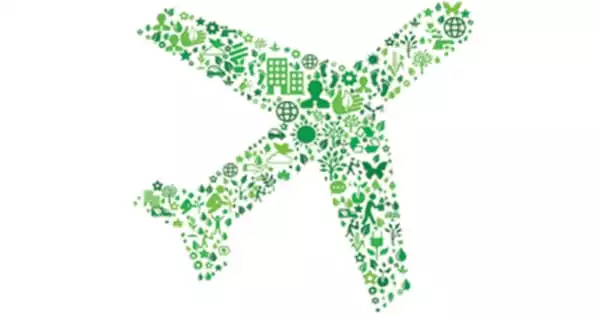The aviation industry is necessary in today’s world, but it has a negative impact on the environment due to emissions from petroleum-based fossil fuels. According to a new study, switching to a sustainable aviation fuel (SAF) derived from plants could reduce these emissions by up to 68 percent. Specifically, the non-edible oilseed crop Brassica carinata, a mustard plant variety. It may also be less expensive than petroleum fuel.
According to new research from University of Georgia scientist Puneet Dwivedi, replacing petroleum-based aviation fuel with sustainable aviation fuel derived from a type of mustard plant can reduce carbon emissions by up to 68 percent.
Dwivedi was part of a team that calculated the break-even price and life cycle carbon emissions of sustainable aviation fuel (SAF) derived from oil extracted from Brassica carinata, a non-edible oilseed crop. The research was published in the journal GCB Bioenergy.
“If we can secure feedstock supply and provide appropriate economic incentives along the supply chain, we may be able to produce carinata-based SAF in the southern United States,” said Dwivedi, an associate professor at the Warnell School of Forestry and Natural Resources. The aviation industry accounts for 2.5 percent of all carbon dioxide emissions in the United States and accounts for 3.5 percent of global warming. “Carinata-based SAF could help reduce the aviation sector’s carbon footprint while creating economic opportunities and improving the flow of ecosystem services throughout the southern region.”
Replacing petroleum-based aviation fuel with sustainable aviation fuel derived from a type of mustard plant can reduce carbon emissions by up to 68%.
Puneet Dwivedi.
Biden’s sustainable fuel tax credit
Dwivedi’s discoveries have come at an opportune time. President Joe Biden proposed a sustainable fuel tax credit in September as part of the Sustainable Aviation Fuel Grand Challenge, which brings together federal agencies to scale up SAF production nationwide. Biden set the goal of reducing aviation emissions by 20% by 2030 and achieving a zero-carbon aviation sector by 2050.
According to the team’s findings, the proposed tax credit requires a 50% reduction in life cycle carbon emissions, which carinata exceeds. Based on existing economic and market incentives, the cost of producing SAF from carinata ranged from $0.12 per liter on the low end to $1.28 per liter on the high end. When current economic incentives were considered, the price of petroleum-based aviation fuel was $0.50 per liter, which was higher than the price of carinata-based SAF.
“The current policy mechanisms should be maintained to support the production and distribution of SAF. President Biden’s Grand Challenge could be a game-changer in supporting carinata-based SAF production in the southern region “Dwivedi explained.

Growing carinata in the Southeast
Dwivedi is a member of the Southeast Partnership for Advanced Renewables from Carinata, or SPARC, a $15 million project funded by the National Institute of Food and Agriculture of the United States Department of Agriculture. SPARC researchers have spent the last four years investigating how to grow carinata in the Southeast, focusing on optimum genetics and best practices for maximum crop and oil yield. Dwivedi is confident in carinata’s role in supporting the regional economy and environment now that he has those answers.
“We can grow carinata as a winter crop in the South because our winters are not as harsh as in other parts of the country,” he explained. “Carinata is grown in the ‘off’ season, so it does not compete with other food crops and does not cause food versus fuel conflicts. Carinata also provides all of the cover-crop benefits related to water quality, soil health, biodiversity, and pollination.”
According to Dwivedi, the missing piece of the puzzle is a lack of local infrastructure for crushing the seed and processing the oil into SAF. His current research focuses on the economic and environmental feasibility of producing and consuming carinata-based SAF in Georgia, Alabama, and Florida from a supply-chain standpoint.
“Our findings would be especially relevant to the state of Georgia, which is the country’s sixth-largest consumer of conventional aviation fuel, home to the busiest airport in the world, and home to Delta, a leading global airline company,” he said. “I am excited to conduct additional research in order to provide a sustainable alternative to our current air travel model. Carinata has the potential to benefit our rural communities, the aviation industry, and, most importantly, climate change.”
Although aviation emits a fraction of the greenhouse gases emitted by other modes of transportation, the industry has come under increased scrutiny as it exemplifies the social and economic divide between rich and poor countries.
A person in a poorer country would not be responsible for as many carbon emissions as a frequent flyer from a rich country due to a lack of access. Google, the search engine giant, has released a new tool that allows customers to calculate their carbon footprint when flying.
















